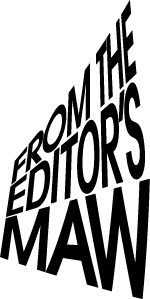 |
     by Quentin Long ©2010 Quentin Long |
||
|
|
|||
 |
     by Quentin Long ©2010 Quentin Long |
||
|
|
|||
I recently attended a dramatic reading of some stories I was familiar with; no music, no sound effects, just one single performer’s voice. I’d like to say it was an unalloyed pleasure, but unfortunately, the performer had a major problem which (for me, at least) cast a pall over the whole thing. The performer’s voice sounded pretty darned good, tone-wise; they enunciated well (no garbled words); they did a good job of capturing/portraying the various levels of emotional intensity in the stories they performed. So… what didn’t they do well?
In one word: Dialogue. Yes, the performer’s voice was clear and sounded good and so on… but as best I could tell, they used the same voice for everything, including all of the characters’ spoken lines—not even so much as raising or lowering the pitch of their voice to help distinguish between narrative passages and characters’ lines! Had I not been familiar with the material they were performing, I would have found it very difficult to keep track of who was saying what, thanks to the general uniformity of the performer’s voice. As it was… well, I managed.
Now, you could say that the performer was handicapped by the fact that it was a minimalist production—that it would surely have been easier to follow what the characters were saying if the performer’s voice had been accompanied by other sonic cues, sound effects and the like. Perhaps so—but it seems to me that if you’re an artist (a performing artist, in this case) with a limited number of ‘tools’ in your ‘toolbox’ (i.e., nothing but your voice), that makes it all the more important for you to exploit all of the possibilities your ‘tools’ offer, to the greatest extent you decently can.
Much the same principle applies to craft of writing: When you get right down to it, the only thing an author even has to work with is the glyphs of written language marked on a contrasting surface, whether it’s ink-on-paper or varicolored-lights-on-screen or whatever. This form of communication is obviously effective, but at the same time, it’s not what you’d call high in bandwidth; if you disagree, consider how many pages of text it would take to fully describe five seconds of conversation between two friends, complete with all the facial expressions, hand gestures, changes in vocal tone, body language, etc.
The good news is, authors can cheat. Yes, written language is restricted to a tiny subset of abstract visual symbols… but each one of those symbols can and does carry a freightload of connotations—associated concepts—over and above its mere dictionary definition! So if you’re writing a story, it only makes sense to think about what sort of words—and, in consequence, which connotations—you’ll be using for which characters. An analogy: If you were a composer trying to write an ominous musical theme, you probably wouldn’t want that theme to be played on a mellow-sounding instrument like a French horn, right?
I suspect most people don’t concern themselves with this sort of thing; they just use whatever words they like, without worrying overmuch about why they like or dislike any given word. However, word choice can make a difference, whether you’re aware of it or not. Imagine, if you will, that you’re out walking on the street, and someone you vaguely know—say, one of your co-workers—greets you with one of the following remarks:
| What’s up? | Howdy! | Greetings! |
| Hello! | Hey, buddy! | How ya doin’? |
| Yo, dude! | Salutations! | Hi there! |
Can you honestly say that you’d react the same way to “Hello” as you would to “Yo, dude”? Can you honestly say that your opinion of this person (what sort of personality they’ve got, etc) would be the same, regardless of whether they’d said “Salutations” or “Hi there”? Somehow, I think not.
Bottom line: Word choice matters, particularly for writers. It influences how people will react, what they think. So if you happen to be a writer, you definitely should give some thought to whether the words you choose are doing what you want.